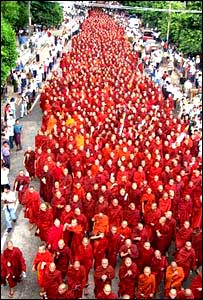
Download Blogs are an alternative source of independence news in Burma as all other media such as newspapers, radio, and TV are controlled by the military regime.
The bloggers gained international attention during the ‘Saffron Revolution’ against the government lead by the countries monks in 2007. Bloggers were the main source of news and uploaded video and images of the protest.
As our reporter Banyar Kong Janoi found out, the blogs are an important source of election news for young people inside Burma.
He spent two days with a renowned blogger inYangon.
An internet shop in Yangon is full of customers.
Most of them are young.
All though there is still no date for the election, there are many online forums with open heated debate about the poll.
University student, Mi Sike Ka-mar Chan, says she has learned a lot about the election online.
“2010 election is a heated issue in every blogs. On their discussion page, some people comment the election is good for people while others criticize. Some criticize the National League for Democracy Party not joining the election while others support them for boycotting it. There are a lot of blogs about Burma. We just read the ones that interest us. The blog suits Burmese people because they have a low bandwidth so we can open them easily.”
Another university student, Moe Kyaw, says blogs are his only source of information.
“I learnt from the blog about the 2010 election especially from the blogs which focus on politics. They post how to vote and they post the regulation of the election. By reading those posts we know the answers and we can say why we don’t agree with the election.”
The freeforcountry.tayzartay.com blogger is based in Rangoon.
He is calling for radical changes to the election process.
“We want to see an election of international standard. The government must change. We want a government who is truly elected by the people. We have lived under a military dictatorship since birth. Because of these we have to struggle to live. Compared to other countries we are behind because of the military leaders. That’s why we must follow other countries and lift the living standard of the people. We are fighting with our pen to explain to people from our blog.”
His blog became popular among young people inside Burma and gained an international audience after the ‘Saffron Revolution’ in 2007 when monks staged large street protests against the military regime in Burma.
The bloggers played a critical role by uploading images and telling the true story. In response the government cut internet access to the entire country.
A ‘Force for Country’ blogger explains how they avoid the government censorship.
“We need software, proxy numbers to pass through a banned server to login our blogs. The free proxy can be expired. So we share among our peers and we found new tech and proxy numbers that can pass the server to upload posts. We upload it in different internet cafés because if we upload at a permanent shop and post with a single IP, the authorities would know; they would come and arrest us. Typing in the house, we just upload the post in the shop within a minute. As soon as we have uploaded we leave.”
Shop owners are required to report customers who are looking at banned websites or sites that criticise the government.
They have been ordered by the government to check each user’s screen every 15 minutes to monitor their online activities.
On all the PCs in this internet café is a sign that reads: “You are not allowed to see political and pornography websites.”
Youtube, Google mail and Yahoo mail are blocked.
However many users are smart enough to surf banned websites through proxy servers.
But bloggers working inside the country do so at great risk.
28-year-old blogger, Nay Phone Latt, was sentenced to 20 years in jail in 2008 for posting a cartoon of the military leader, Than Shwe.
‘Free for country’ bloggers says security is very important.
“We can’t just look at the screen; we always have to look around us and see who is looking at us. When we are uploading, we do not use a full screen. We use the “restore down” function- half screen. While we are uploading the post we pretend to be surfing other websites so people don’t pay attention to us.”
He says he takes the risks because it’s his responsibility as a citizen of Burma.
“I don’t get any support in the way of funds to operate this blog. I just save from my pocket money to use the Internet for uploading posts. I get technical help from my friends who are better with computers. We can present the true story. It’s incredible when we go on a field trip; we can upload pictures which tell the true current story. When people understand the situation and learn from our blog, we are happier than if we got paid for our work. I feel this job is important so I do it.”
He says he is very honest in his work.
“I am very concerned with accuracy. I go into the field to collect information. Although there is not a lot of news on my blog it’s more of a watchdog. I monitor the work of civil servants and government officials. If I get a new’s tip, I will investigate further before posting it and I will take photos.”
Back in the Rangoon internet café university student, Nai Rot Khine, says bloggers are a lifeline for her generation.
“As for me, reading blogs is very important. We can read different kinds of issues. We can read open discussion about the current politics so we can make ourselves rich in knowledge.”

No comments:
Post a Comment